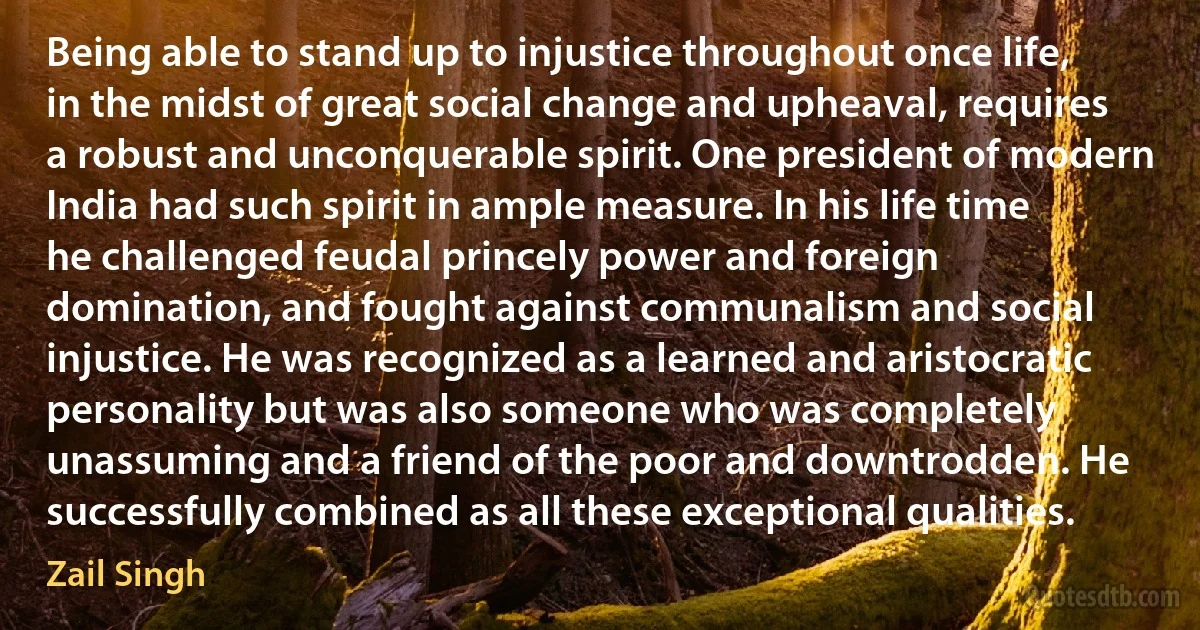Combined Quotes - page 17
The law of habit exhibits a striking contrast to all physical laws in the character of its commands. A physical law is absolute. What it requires is an exact relation. Thus, a physical force introduces into a motion a component motion to be combined with the rest by the parallelogram of forces; but the component motion must actually take place exactly as required by the law of force. On the other hand, no exact conformity is required by the mental law. Nay, exact conformity would be in downright conflict with the law ; since it would instantly crystallise thought and prevent all further formation of habit. The law of mind only makes a given feeling more likely to arise. It thus resembles the "non-conservative" forces of physics, such as viscosity and the like, which are due to statistical uniformities in the chance encounters of trillions of molecules.

Charles Sanders Peirce
Along with other industrial democracies who are our friends, we lead the way in technological innovation. Our combined economies are more than three times as productive as those Of the Soviet Union and all its allies. Our political institutions are based on human freedom. Our open system encourages individual initiative and creativity, and that in turn strengthens our entire society.

Jimmy Carter
I am absurdly fearful, and various omens have combined to give me a dark feeling. I am become indeed a miserable coward, for the sake of Angelino. I fear heat and cold, fear the voyage, fear biting poverty. I hope I shall not be forced to be as brave for him, as I have been for myself, and that, if I succeed to rear him, he will be neither a weak nor a bad man. But I love him too much! In case of mishap, however, I shall perish with my husband and my child, and we may be transferred to some happier state.

Margaret Fuller
The United States is on pace to spend over $7 trillion over the next ten years for the Pentagon. To put that number in perspective, the U.S. spends more each year on the military than China, Russia, India, the U.K., Germany, France, Japan, South Korea and Australia combined. While Republicans and Democrats are in sharp disagreements over the much smaller Build Back Better legislation, there is largely a bipartisan consensus when it comes to the military budget and foreign military intervention...

Amy Goodman
Broadly speaking, the city of the future will not bring to its center any goods not intended for use or consumption therein. At Chicago 66% of the tonnage in and out is not for home use, but for distribution to other places. In view of this fact we designed a general freight scheems for the entire city's use, with car yards, freight depots and warehouses combined, eight miles from the city, where all trains shall unload and reload. [...] I believe that such a course would be economical both for the public service companies and the city government; certainly it would prolong the life of the street paving and eliminate congestion and a constant source of dirty and disorder. Can it be doubted that the city of the future will operate its cental street system, possibly all its streets, in this manner?

Daniel Burnham
Beijing is now the second-largest funder of the UN and UN peacekeepers. It has deployed 2,500 peacekeepers, more than all the other permanent members of the Security Council combined. Between 2000 and 2008 it supported 182 of 190 Security Council resolutions imposing sanctions on nations deemed to have violated international rules or norms.

Fareed Zakaria
Between them these two books sum up our present predicament. Capitalism leads to dole queues, the scramble for markets, and war. Collectivism leads to concentration camps, leader worship, and war. There is no way out of this unless a planned economy can somehow be combined with the freedom of the intellect, which can only happen if the concept of right and wrong is restored to politics.

George Orwell
Encourage free schools, and resolve that not one dollar of money shall be appropriated to the support of any sectarian school. Resolve that neither the state nor nation, or both combined, shall support institutions of learning other than those sufficient to afford every child growing up in the land the opportunity of a good common school education, unmixed with sectarian, Pagan, or Atheistical tenets. Leave the matter of religion to the family altar, the church, and the private school, supported entirely by private contributions. Keep the church and the state forever separate. With these safeguards, I believe the battles which created the Army of the Tennessee will not have been fought in vain.

Ulysses S. Grant
The wellspring of courage and endurance in the face of unbridled power is generally a firm belief in the sanctity of ethical principles combined with a historical sense that despite all setbacks the condition of man is set on an ultimate course for both spiritual and material advancement. It is his capacity for self-improvement and self-redemption which most distinguishes man from the mere brute. At the root of human responsibility is the concept of perfection, the urge to achieve it, the intelligence to find a path towards it, and the will to follow that path if not to the end at least the distance needed to rise above individual limitations and environmental impediments. It is man's vision of a world fit for rational, civilized humanity which leads him to dare and to suffer to build societies free from want and fear. Concepts such as truth, justice and compassion cannot be dismissed as trite when these are often the only bulwarks which stand against ruthless power.

Aung San Suu Kyi
On 10th February 1839, he commenced a periodical, named "Il Gatto Letterato, Foglio periodico," dated in Capolago (a town in Italian Switzerland), but printed at Naples (without licence); and for a "Lettera di un Frenologo ad un Dottore degli Stati Pontifici" (" Letter from a Phrenologist to a Doctor in the Papal States"), he was called before the Santa Sede (Holy Tribunal); and afterwards, in 1840, for several other articles, he was seized and imprisoned for 28 days. He was suspended from his office of physician in ordinary to the Royal Lunatic Asylum at Aversa, and crushed to the earth by every engine of persecution which bigotry and tyranny, combined, could employ against Him.

Luigi Ferrarese
When the Church says that, in the dogmas of religion, reason is totally incompetent and blind, and its use to be reprehended, this really attests the fact that these dogmas are allegorical in their nature, and are not to be judged by the standard which reason, taking all things sensu proprio, can alone apply. Now the absurdities of a dogma are just the mark and sign of what is allegorical and mythical in it. In the case under consideration, however, the absurdities spring from the fact that two such heterogeneous doctrines as those of the Old and New Testaments had to be combined. The great allegory was of gradual growth. Suggested by external and adventitious circumstances, it was developed by the interpretation put upon them, an interpretation in quiet touch with certain deep-lying truths only half realised. The allegory was finally completed by Augustine, who penetrated deepest into its meaning, and so was able to conceive it as a systematic whole and supply its defects.

Arthur Schopenhauer
There are three principal means of acquiring knowledge available to us: observation of nature, reflection, and experimentation. Observation collects facts; reflection combines them; experimentation verifies the result of that combination. Our observation of nature must be diligent, our reflection profound, and our experiments exact. We rarely see these three means combined; and for this reason, creative geniuses are not common.

Denis Diderot
All relations are either qualitative or quantitative. Qualitative relations can be considered by themselves without regard to quantity. The algebra of such enquiries may be called logical algebra, of which a fine example is given by Boole.
Quantitative relations may also be considered by themselves without regard to quality. They belong to arithmetic, and the corresponding algebra is the common or arithmetical algebra.
In all other algebras both relations must be combined, and the algebra must conform to the character of the relations.

Benjamin Peirce
I never understood the ultimate answer. That was beyond me. It took the combined skills of three great civilizations far apart in time to frame that godlike concept in which the tangible universe itself was only a single factor.
And even then it was not enough. It took the Face of Ea - which I shall never be able to describe fully.
I saw it, though. I saw it...

Henry Kuttner
You appear to have seen Holcrofts pamphlet; which certainly displays much ability and goodwriting, but most of all the extreme vanity and self-importance of the author, which is equally ridiculous and disgusting. He thinks it impossible that any court or jury in the world could have resisted the force of his combined eloquence and philosophy; and actually told me that hewould gladly have given one of his hands for the opportunity of making his defence, which by the way would certainly have hanged him, however favourable his judges might have been beforehand.

Joseph Ritson


![I stand firm: neither Protogenes, Apelles nor Parrhasius ever came up with the idea, nor, if they were to return to earth could they produce anything like this, created by a young, as yet beardless Hollander [Rembrandt, c. 1631], a miller, what he has combined in one figure and created in its entirety. It fills me with astonishment even as I say it. Congratulations Rembrandt!. ..the achievement of a Dutchman who has never ventured outside the walls of his native city. (Rembrandt)](https://cdn.quotesdtb.com/img/quotes_images_webp/45/rembrandt-achievement-anything-astonishment-1013545.webp)
